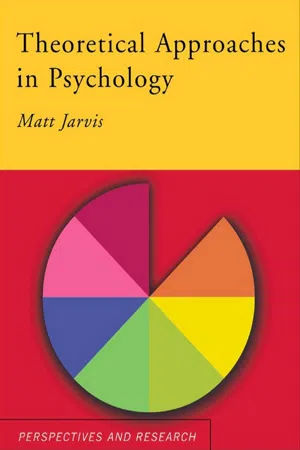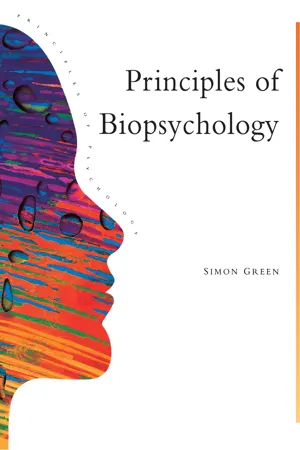Biological Evidence
Biological evidence in psychology refers to the physical indicators of biological processes that influence behavior and mental processes. This evidence can include brain imaging, genetic markers, and physiological measures such as hormone levels. By studying biological evidence, psychologists can gain insights into the biological underpinnings of psychological phenomena, leading to a better understanding of human behavior and mental health.
5 Key excerpts on "Biological Evidence"
- eBook - ePub
- Hugh Wagner, Kevin Silber(Authors)
- 2004(Publication Date)
- Taylor & Francis(Publisher)
...Section A – The science of physiological psychology A1 P SYCHOLOGY AND BIOLOGY Key Notes The biological context of psychology Psychology is a biological science: humans are products of evolution, and mental processes and behavior are dependent on the body. Evolutionary psychology examines the evolution of human behavior. Applied to social behavior this is sociobiology. Physiological psychology studies the physiological mechanisms underlying psychological processes. Reductionism Explaining mental processes and behavior in physiological terms is reductionism. While some argue that reductionism is flawed, few physiological psychologists would argue that theirs is the only useful approach. Reductionism does not imply that one particular level of analysis is ‘correct’. We can choose levels of analysis that are appropriate for our purposes. Human evolution Darwin proposed that evolution proceeds by a process of natural selection. Natural selection applies to individuals, not groups. It is the fittest individual who survives, not the fittest species. Changes in fitness come from mutations in genes. Most mutations are harmful, and the individuals carrying them are less likely to reproduce. Advantageous mutations can provide a selective advantage. Eventually, accumulated advantageous mutations make the individual so different from its ancestors that a new species emerges. Genetics and the ‘nature–nurture’ issue Each gene carries the code for the production of a particular molecule. These molecules are the basis of cell and tissue development. We have 23 pairs of chromosomes in the nucleus of most of our cells, and inherit one of each pair from each parent. This produces genetic diversity in the offspring. Genes on the same chromosome are not always inherited together. The genetic makeup of each individual organism is its genotype. The extent to which a gene exerts its effect depends on environmental influences, resulting in the phenotype...
- eBook - ePub
- Matt Jarvis(Author)
- 2005(Publication Date)
- Routledge(Publisher)
...they reduce complex psychological phenomena to simple biological processes. This can have negative consequences. In the example given above, for example, whilst old paint might be one contributing factor in the relationship between poverty and intellectual development it certainly isn’t the only factor or even the most important one. We could not remove the impact of poverty just by repainting all old properties, and it is dangerous and misleading to suggest that we could. There will always be some aspects of psychology that cannot be explained by adopting a physiological approach. For example, we might know that people suffering from depression typically have lowered levels of serotonin, and that we can correct this with drugs. However, this does not tell us why people who lost a parent in early childhood are more likely to suffer depression as an adult. That requires another level of explanation that can be provided by one of the other theoretical approaches. Summary Biological approaches to psychology use three key ideas from biology, genetics, evolution and physiology to understand psychology. Behavioural genetics is the study of the heritability of psychological characteristics. Genes have been implicated in a number of psychological variables, including intelligence and some mental disorders. Evolutionary psychologists have suggested that many of our characteristics and abilities have developed through a process of evolution because they are useful to us in some way. Neurophysiology focuses on the structure and function of the brain and nervous system and the ways in which these contribute to psychological functioning. New scanning techniques have allowed us to gain an increasing knowledge of brain function. One area of study in neurophysiology concerns bodily rhythms. Our knowledge of circadian rhythms has allowed us to understand the effects of jet lag and shiftwork. An understanding of ultradian rhythms has enriched our knowledge of sleep and dreaming...
- eBook - ePub
- G Neil Martin(Author)
- 2015(Publication Date)
- Routledge(Publisher)
...There are some terms used to describe specific types of biological psychology (and, therefore, biological psychologist) and there are other terms that are synonymous with it. Some of the terms that are interchangeable with biological psychology include psychobiology and physiological psychology – to all intents and purposes, all of these terms refer to the same discipline. Other terms that refer to specific areas of biological psychology include neuroscience, neuropsychology, histology and psychoneuroimmunology. Neuroscience Neuroscience is an area of study where psychology, physics, chemistry and biology converge. It refers to the study of the neural basis of behaviour, and much of the work in the area is cellular in nature. Neuroscientists are interested in how specific brain cells, types of brain cell or groups of brain cells contribute to brain function and to behaviour. For example, neuroscientists may be interested in discovering whether specific types of cell are involved in specific behaviours (such as object or face recognition); they might be interested in discovering which chemical systems in the brain become active or inactive during certain psychological states such as sleep, mental impairment, depression, schizophrenia, and so on. It is sometimes prefaced by 'cognitive' to indicate that the study involves the neural basis of aspects of cognition such as using language, recognising objects, places and faces, recognising and experiencing emotion, performing mental arithmetic tasks, engaging in visual imagery, and so on (Posner and DiGirolamo, 2000). Some psychologists combine what seem on the surface to be entirely different branches of the discipline, such as neuroscience and social psychology...
- eBook - ePub
- (Author)
- 2012(Publication Date)
- Wiley(Publisher)
...Chapter 3 Biological Psychology Robert E. Clark, Jena B. Hales, Stuart M. Zola, and Richard F. Thompson The Mind The Brain Sensory Processes Learning and Memory Motivation and Emotion Cognitive Neuroscience Conclusion References The great questions of philosophy, the mind–body problem and the nature of knowledge, were also the questions that drove early developments in the pathways to modern psychology. This is especially true of biological or physiological psychology. Wilhelm Wundt, who founded experimental psychology, titled his major work Foundations of Physiological Psychology (1874/1908). William James, the other major figure in the development of modern psychology, devoted a third of his influential text Principles of Psychology (1890) to the brain and nervous system. Both Wundt and James studied medicine and philosophy, and both considered themselves physiologists. Their goal was not to reduce psychology to physiology but rather to apply the scientific methods of physiology to the study of the mind. The other driving force in early biological psychology was the study of the brain and nervous system. The major topics in modern biological psychology are sensory processes, learning and memory, motivation and emotion, and, most recently, cognition—in short, behavioral and cognitive neuroscience. A number of other areas began as part of physiological psychology and have spun off to become fields in their own right. We treat the major topics in biological psychology separately in the text that follows. But first we sketch very briefly the recent philosophical and physiological roots. The Mind The history of such issues as the mind–body problem and epistemology is properly the domain of philosophy, treated extensively in many volumes and well beyond the scope of this chapter and the expertise of these authors...
- eBook - ePub
- Simon Greene(Author)
- 2013(Publication Date)
- Psychology Press(Publisher)
...1 What is Biopsychology? T he term biopsychology is just one of many names given to that area of science which studies the relationship between biology and behaviour. Others include psychobiology, biological psychology, and physiological psychology. Biology refers to all the physiological systems we find find in the body— muscles, the blood supply, glands, the nervous system etc. In practice, the study of biology and behaviour concentrates on the brain and the nervous system, although we will be covering the role of glands and hormones in, for instance, emotion and stress. Researchers from many backgrounds work in biopsychology. They may be neurologists, neurophysiologists, neuroanatomists, pharmacologists, biochemists, or psychologists. Although psychologists cannot usually compete on a specialist level with, for instance, a biochemist interested in the synapse, psychology plays a vital role in the study of brain and behaviour. The biochemist or neuroanatomist often assumes that brain structure and biochemistry are complicated, whereas behaviour is simple. The psychologist, on the other hand, knows that even apparently simple behaviour, such as the rat exploring a maze or a human falling asleep, is in fact as complicated as the underlying physiology. So a complete description and explanation of the links between brain and behaviour involves an analysis of behaviour by psychologists that is just as sophisticated as the analysis of brain structure and biochemistry. The biopsychologist therefore has to become familiar with the terminology and findings from the basic brain sciences mentioned earlier. This has led to the accusation by other psychologists that biopsychologists support a reductionist approach to the explanation of behaviour. Reductionism Psychology is the scientific study of behaviour. It can range from the study of large crowds, through the dynamics of small group interactions, to the study of the individual...




